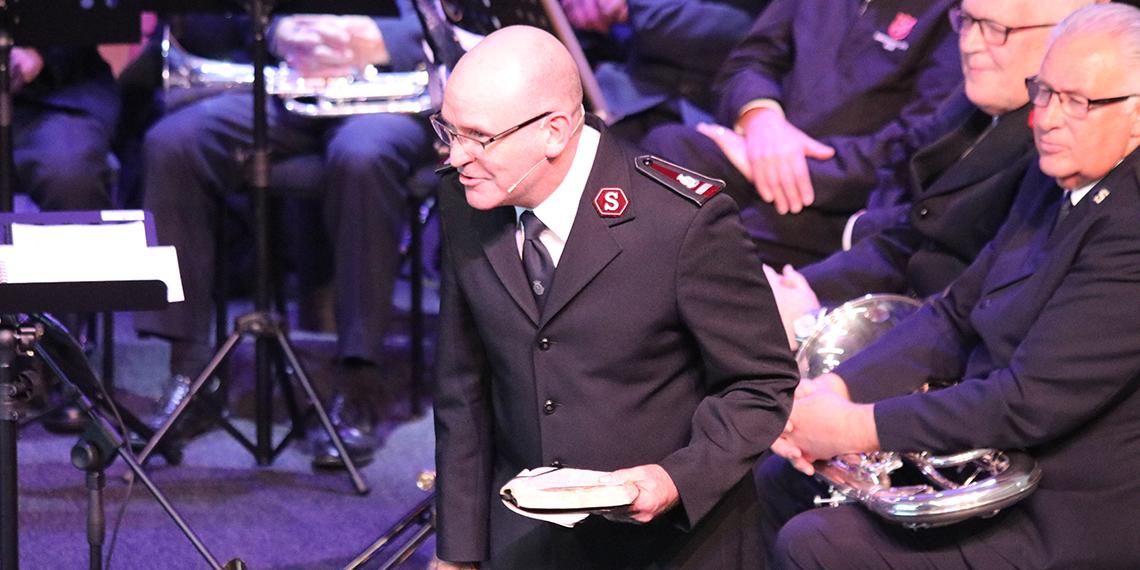You are here
‘Can These Bones Live?’ New Zeal Christchurch

Over 300 Salvationists gathered at Christchurch City Corps, with hundreds more gathering across New Zealand, to livestream the powerful message by Chief of the Staff, Commissioner Lyndon Buckingham.
The backdrop for Lyndon’s sermon was Ezekiel 37, which asks: ‘Can these bones live?’
With his usual enthusasium, passion and humour, Lyndon launched into his sermon, acknowledging what it means to minister on home soil. ‘I feel so honoured and privileged and blessed to be able to speak with you this morning—I have to tell you it is so good to be home, to touch my own land.’
Lyndon began with Colossians 1:6, All over the world this gospel is bearing fruit ...‘Lives are being transformed, people are coming to salvation, people are being given new hope, people are being lifted up, barriers are being broken and new life is emerging all over the world,’ said Lyndon.
Yet some people question if it’s really happening, if we have lost ground and our best days are behind us. ‘The truth is, even today, as a result of faithful salvationists around the world and others who call on the name of the Lord ... people are coming to understand God’s love for them in the person of Jesus Christ.’
Can these bones live?
Ezekiel’s vision of the valley of the dry bones appears to be at odds with the positivity of Colossians 1:6. Lyndon acknowleged some might ask, ‘Why would you make reference to a people who are saying, “Hope is gone, it’s finished, it’s over”?’
The Israelites felt their best days were behind them, they felt abandoned by God. Some people are ‘paralysed by a lack of hope, by some myth that we are no longer able to be a powerful force in the hand of God—it’s simply not true.’
The point of the story is not the dry bones, but the question: Can these bones live? This vision is about God himself: ‘God is asking, “Do you believe that I have the power, Ezekiel, to make these bones live? Do I have the capacity to step into something that might seem hopeless, over, dead, forgotten—do you have faith to believe I can step into that?”’
When God breathes life into someone, he has reason and purpose for it—what might that be? Lyndon asked. ‘God brings life, wholeness and freedom.
‘Maybe there’s a dry patch, a dry bone, a skeleton in our closet—stuff that wears us down. Maybe when the Spirit comes, he wants to do some work in us so that we would be men and women who will live and breathe the values of the Kingdom.’
Four directions
Lyndon called us to consider four directions we might focus on as we look for God to move in our lives. ‘We look up—so as to give you praise. We look in—that you might do a work in me. We look around—and recognise that what we want in our communities of faith is the Holy Spirit. God might do some work on us as a community of faith, addressing areas of conflict and challenge. We Look out—and think about the world in which we live. We might be overwhelmed by all the stuff that goes on in the world and the darkness around us. But isn’t it amazing to us that God the Holy Spirit is at work in our world—he’s pushing back darkness.’
A time of encounter
There was an immediate response in Christchurch with the Mercy Seat lined with people saying ‘Yes’ to more of God. Across the country, reports are coming in of people responding and experiencing an encounter with God.
Christchurch City Corps band and songsters, along with the music team from Sydenham Corps led by Tracy Boon, laid the foundation for the sermon. Tracy used snow as an illustration of what can happen when the body of Christ comes together to seek God. Snow starts with a single snow flake, and then another and another, and before you know it, you have a snow storm. The children from Linwood Corps presented a thought-provoking video and scripture presentation about the power of words and the importance of doing something when we see injustice occur.
Corps in Fiji played the message the following Sunday—watch out for our report in an upcoming issue of War Cry.